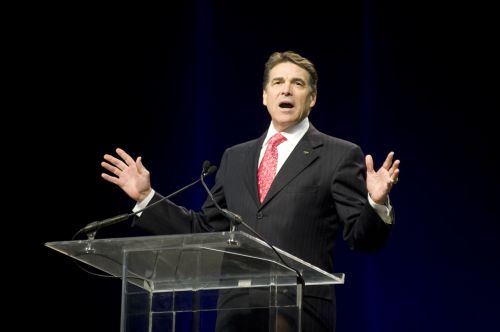DES MOINES, Iowa (AP) ― Though he’s not officially a candidate, Texas Gov. Rick Perry’s visits this weekend to three important presidential nominating states threaten to overshadow any lift his would-be rivals hope to gain from a big week in Iowa.
Perry’s expected entrance into the Republican race looms large over Saturday’s Iowa straw poll and a nationally televised debate two days earlier ― and he’s not participating in either event. His all-but-certain bid comes as polls show the GOP electorate underwhelmed with the current crop of candidates as they seek someone strong to challenge President Barack Obama next fall.
 |
Rick Perry (AFP-Yonhap News) |
All candidates ― from GOP front-runner Mitt Romney on down ― are bracing for a Perry candidacy.
Publicly, the field is welcoming Perry to the contest. Privately, the candidates and their advisers are discussing how to revamp their strategies for winning the nomination, given a likely new factor in the race ― a telegenic Texan who is credible on social conservatives’ top issues and who hails from a state where jobs have grown.
“I know Rick. I think he’ll be a strong candidate, but like I said, my candidacy doesn’t rise or fall depending on whether other people get into the race or not,” former Minnesota Gov. Tim Pawlenty, who is languishing in polls, said Tuesday during an interview with Radio Iowa.
Rep. Michele Bachmann’s spokeswoman, Alice Stewart, acknowledged that the Minnesota congresswoman’s campaign has discussed a strategy should Perry formally enter the race. But, Stewart added, “we’re focused 100 percent on meeting the people in Iowa and doing well in the straw poll.”
Of them all, Romney may have the most to lose.
“Our view is the more the merrier,” Romney strategist Eric Fehrnstrom said as it was disclosed that Perry would visit the leadoff caucus state of Iowa on Sunday, a day after back-to-back appearances in New Hampshire and South Carolina.
“Mitt Romney got into the race because he felt that what was needed was someone with a long record of experience in the private sector.”
It was a sign of how Romney, a successful businessman who founded a venture capital firm before entering politics and serving one term as governor, intends to contrast himself with Perry, who has never held a private sector job and has held elected office or government positions for the last 27 years. And it also may have been a sign of just how seriously Romney’s team is taking the Texan.
“Rick Perry has the potential to really hurt Romney,” said Jamie Burnett, who is not affiliated with a campaign this year but was Romney’s 2008 New Hampshire political director. “Obviously, he’s also going to hurt everybody else in the process.”
Consider:
He’s the chief executive of a state whose economy grew during the recession, a counterpoint to a Romney campaign that’s focused heavily on job creation.
He’s the head of the Republican Governors Association, with deep connections to the party establishment that hasn’t yet rallied around any one candidate, and long ago left former House Speaker Newt Gingrich.
He’s an outspoken supporter of states’ rights, a libertarian tilt that could help him attract Texas Rep. Ron Paul backers.
He’s a staunch social conservative with a certain amount of tea party support who could cut into Bachmann’s base.
He’s planted himself firmly in the Christian camp ― with a prayer rally last weekend in Houston that attracted 30,000 people, and, thus, could appeal to evangelicals who have been courted heavily by Pawlenty.
Perry, to be sure, has his problems. He has drawn mixed reviews from tea party groups who question his policies on immigration, public health and infrastructure projects. And there are questions about how much credit Perry should get for Texas’ job growth. He also has never run for office outside of Texas.








![[Today’s K-pop] Blackpink’s Jennie, Lisa invited to Coachella as solo acts](http://res.heraldm.com/phpwas/restmb_idxmake.php?idx=644&simg=/content/image/2024/11/21/20241121050099_0.jpg)